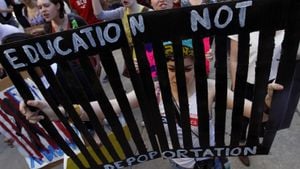The recent sessions of the South Korean National Assembly have opened the door to scrutiny surrounding the emergency martial law declaration by President Yoon Suk-yeol. The extraordinary declaration, made on December 3, 2024, aimed to quell rising political dissent but has since ignited fierce debates and concerns about its legality and motivations. The National Assembly's special investigative committee is now tasked with examining the political ramifications and procedural appropriateness of the martial law, drawing attention to testimonies from key figures involved.
On January 22, 2025, during the first hearing of this inquiry, former National Intelligence Service (NIS) Deputy Director Hong Jang-won provided alarming insights. He described the atmosphere within the intelligence community leading up to Yoon's declaration, asserting, "This is unprecedented for our National Assembly to be investigating such a heavy-handed response to political dissent." His statements revealed confusion and panic among NIS officials, primarily concerning their unawareness of imminent political maneuvers.
Hong recounted pivotal details from the evening of the martial law proclamation. He relayed receiving instructions from President Yoon during their 8:22 PM phone call, where the president indicated he had significant information to impart, leaving Hong uncertain how to proceed. The unexpected announcement sent shockwaves through the NIS, raising questions about the decision-making process among the nation’s highest echelons of power.
Adding to the complexity, Hong explained his realization of the political target involved only after speaking with the then-director of the Counterintelligence Command, Yeon Hyun-hyung. "I thought it was about eliminating spy threats rather than targeting political figures," Hong expressed, signaling the convoluted narrative emanated from the crisis around human rights and government accountability. He maintained his position was the norm for intelligence operations, yet this incident was far from the ordinary scope.
Following this alarming communication, Hong found himself frantic, as the emergency proclamation elevated tensions across the political spectrum. According to testimony, his exchanges with Yeon included discussions about the order to detain prominent political figures, implying the administration's extensive clout over dissenters. Hong described the list of political individuals involved, also reflecting on the atmosphere of fear this created.
The investigation has also been met with pushback from current NIS Director Cho Tae-yong, who countered claims by stating, "I can confirm my honor is at stake here by denying any prior reports of such orders." His steadfast denial raised eyebrows, particularly when juxtaposed against Hong's detailed accounts of the events leading to the martial law declaration. Such contradiction heightened the scrutiny of top intelligence officials and their roles during the upheaval.
Controversially, Hong remarked upon the broader picture, implicatively calling out the president's handling of the situation. He pointed to ambiguous wording during his discussions with Yoon, highlighting the dangers associated with vague directives. With many political heavyweights cited as potential targets for arrest, fears of legal overreach have only intensified.
Political analysts assert this inquiry could have lasting impacts on South Korea’s democratic institutions. The marathon of testimonies uncovers not only operational failures but ethical dilemmas surrounding the use of emergency powers. The National Assembly’s commitment to investigating these allegations sends strong messaging about accountability at the highest level.
Hong’s testimony reflects the battle for political transparency, where the legislature's action serves as pivotal for civil liberties and governance. Observers have emphasized the importance of distinguishing between legitimate national security concerns and the suppression of political opposition.
Looking forward, the ramifications of this inquiry remain vast. Citizens and political insiders alike grapple with the realities of how the South Korean government balances security with democracy. With each hearing, the nation inches closer to clarity on one of its most controversial political moments.
Should the investigation reveal systemic issues within the National Intelligence Service and its operations, it may not only reform internal policies but also reshape the relationship between the ruling government and its constituents. The stakes are high as both sides of the political aisle await the committee's findings, anxiously anticipating not just the inquiry’s outcome but also what it means for the stability of South Korea's democratic principles moving forward.



